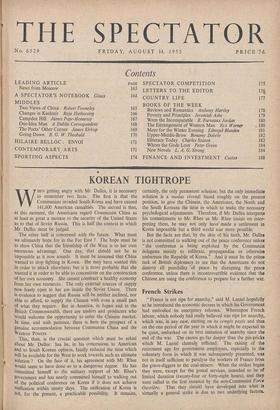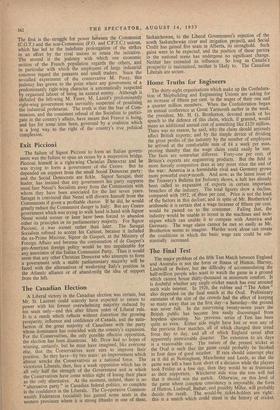French Strikes
" France is not ripe for anarchy," said M. Laniel hopefully as he introduced the economic decrees in which his Government had embodied its emergency reforms. Whereupon French labour, which nobody had really believed was ripe for anarchy, which was, in any case, starting on its conges payes and thus on the one period of the year in which it might be expected to be quiet, embarked on its best imitation of anarchy since the end of the war. The causes go far deeper than the pin-pricks which M. Laniel clumsily inflicted. The raising of the retirement age for government employees, especially in the voluntary form in which it was subsequently presented, was not in itself sufficient to paralyse the workers of France from the grave-diggers to the coal-miners. When the strikes began they were, except for the postal services, intended to be of limited duration (twenty-four or forty-eight hours), and they were called in the first instance by the non-Communist Force Ouvriere. That they should have developed into what is virtually a general strike is due to two underlying factors. The first is the- struggle for power between the Communist (C.G.T.) and the non-Communist (F.O. and C.F.T.C.) unions, which has led to the indefinite prolongation of the strikes in an effort by the rival unions to retain the initiative. The second is the jealousy with which one economic section of the French population regards the others, and in particular with which the employees of large industrial concerns regard the peasants and small traders. Since the so-called experiment of the conservative M. Pinay, this jealousy has grown to the point where any government of a predominantly right-wing character is automatically suspected by organised labour of being its natural enemy. Although it included the left-wing M. Faure, M. Laniel's predominantly right-wing government was inevitably suspected of penalising the industrial proletariat. The truth is that the fear of Com- munism, and the consistent refusal of the Socialists to partici- pate in the country's affairs, have meant that France is being, and has for some time been, governed by a coalition which is a Jong way to the right of the country's true political complexion.



































 Previous page
Previous page